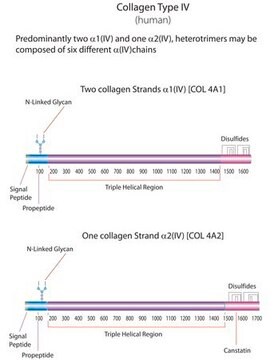Recommended Products
biological source
human epidermis
Assay
≥90% (SDS-PAGE)
form
urea solution
technique(s)
ELISA: suitable
UniProt accession no.
storage temp.
2-8°C
Gene Information
human ... KRT1(3848)
Looking for similar products? Visit Product Comparison Guide
General description
Keratins are characteristic intermediate filament proteins of the epithelia. In human, keratin is classified into type I and type II. About 54 genes encodes for the keratin protein. The keratin 1 (KRT1) gene is mapped to human chromosome 12q13.13. It is the primary component of hair, skin and nails.
Application
Keratin from human epidermis has been used:
- as an analyte and a cross-reactant in the antibody-immobilized chip for testing selectivity coefficients
- as a standard in extracellular matrix (ECM) protein in in vitro protein degradation assays.
- asa a standard in enzyme linked immunosorbent assay (ELISA)
Biochem/physiol Actions
Keratins are important for the mechanical stability and integrity of epithelial cells and tissues. Some keratins also have regulatory functions and are involved in intracellular signaling pathways, e.g. protection from stress, wound healing, and apoptosis. This diverse group of cytoskeletal scaffolding proteins form intermediate filament networks which provide structural support to keratinocytes that maintain the integrity of the skin. Expression of keratin genes is usually regulated by differentiation of the epidermal cells within the stratifying squamous epithelium.
Physical form
Solution in 8 M urea, 50 mM Tris, 0.1 M β-mercaptoethanol and 0.1% sodium azide, pH 8.4
Signal Word
Warning
Hazard Statements
Precautionary Statements
Hazard Classifications
Skin Sens. 1
Storage Class Code
10 - Combustible liquids
WGK
WGK 3
Flash Point(F)
Not applicable
Flash Point(C)
Not applicable
Certificates of Analysis (COA)
Search for Certificates of Analysis (COA) by entering the products Lot/Batch Number. Lot and Batch Numbers can be found on a product’s label following the words ‘Lot’ or ‘Batch’.
Already Own This Product?
Find documentation for the products that you have recently purchased in the Document Library.
Customers Also Viewed
Christian Mozet et al.
Anticancer research, 33(6), 2415-2424 (2013-06-12)
The hedgehog signaling pathway (HH) is involved in tumorigenesis in a variety of human malignancies. In head and neck squamous cell carcinomas (HNSCC), Hh overexpression was associated with poor prognosis. Therefore, we analyzed the effect of Hh signaling blockade with
N O Ku et al.
The Journal of cell biology, 143(7), 2023-2032 (1998-12-29)
Simple epithelia express keratins 8 (K8) and 18 (K18) as their major intermediate filament (IF) proteins. One important physiologic function of K8/18 is to protect hepatocytes from drug-induced liver injury. Although the mechanism of this protection is unknown, marked K8/18
Francesca Angiero et al.
Anticancer research, 33(6), 2673-2677 (2013-06-12)
The adenomatoid odontogenic tumor (AOT) is an uncommon tumor of odontogenic origin, composed of odontogenic epithelium and characterized by slow but progressive growth. We report a rare case of AOT in an 18-year-old, who presented with a palpable bony-hard swelling
Jyh-Hong Lee et al.
Journal of biomedical optics, 14(1), 014008-014008 (2009-03-05)
Atopic dermatitis (AD) is characterized by hyperkeratosis of epidermis and fibrosis within dermis in chronic skin lesions. Thus far, the histology of skin lesions has been evaluated only by examination of excised specimens. A noninvasive in vivo tool is essential
A Pena et al.
Optics express, 13(16), 6268-6274 (2005-08-08)
We recorded one-photon excited fluorescence (1PEF) and two-photon excited fluorescence (2PEF) spectra of purified keratin from human epidermis, and determined the action cross section of this endogenous chromophore. We used this spectroscopic analysis to analyse multiphoton images of skin biopsies
Our team of scientists has experience in all areas of research including Life Science, Material Science, Chemical Synthesis, Chromatography, Analytical and many others.
Contact Technical Service
















